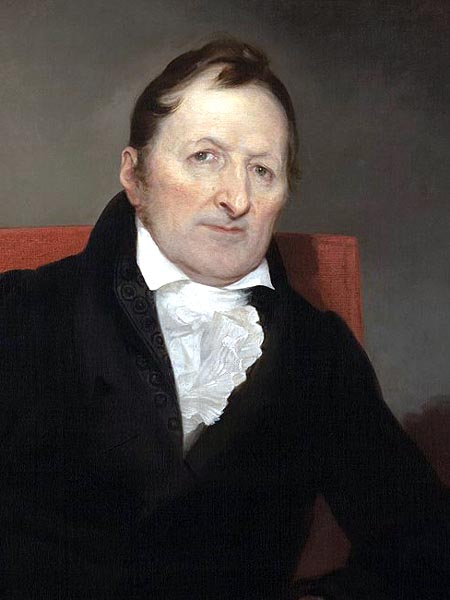 |
| Eli Whitney (Wikipedia) |
Note: Eli Whitney's cotton gin "saved" the economy of the American South--at the same time that it contributed to its downfall. Read on to learn how that can be.
Get Ready: Can you think of any technological advancement that is a "mixed blessing"--bringing both benefits and problems?
As a young country, America did not produce much in the way of scientists. But in the Industrial Revolution, a fair number of inventors rose up, and one of the best known was Eli Whitney (1765-1825), inventor of the cotton gin.
When I was a boy, this device was praised for its role in the production of cotton. When picked, cotton is full of seeds, and must be cleaned before it can be used. This process took a lot of time, and made the growing of cotton less profitable.
Whitney's simple device changed all that. It was, essentially, a series of small hooks that would pull the cotton fibers through a screen small enough that the seeds couldn't pass through.
The cotton gin (the word is short for "engine") helped cotton growers turn a larger profit, and contributed to the economy of the Southern states.
There was a negative side to this benefit, though. It also contributed to the revitalization of slavery in the South, a practice that was losing some of its strength before the gin was introduced in the late 18th century. Some six or seven decades later, war would break out over this horrible institution.
Whitney also inadvertently contributed to the North's success in that war. As a manufacturer (especially of weapons) he promoted the use of interchangeable parts. Before the Industrial Revolution, a complicated item like a gun was made by hand, with uniquely fitted parts. If the item needed repair, it would be taken to a shop where a workman would fix what was broken, perhaps making a replacement part by hand.
Whitney championed the idea of the manufacturing of identical parts, so when something broke, the manufacturer could supply a ready-made replacement part. This naturally brought costs down, and helped the economy of the more industrial Northern states.
Whitney himself benefited little from the cotton gin. It was simple to make, and, because patent law was in its infancy, other manufacturers copied his design. What little money he did make was spent on lawsuits trying to protect his idea.
He died of cancer at age 59.
--------Read more: https://en.wikipedia.org/wiki/Eli_Whitney
Practice: Match the term to its definition below:
- championed
- identical
- inadvertently
- infancy
- interchangeable
- inventor
- lawsuits
- patent
- profitable
- revitalization
- able to make money
- fought for; supported
- able to be replaced by each other
- accidentally; without planning
- exactly the same
- actions in a court, to get money when one has been cheated
- bringing something back to life
- person who comes up with a new idea
- early days
- legal protection for an invention
Answers are in the first comment below.
Submitted to the Shenzhen Daily for June 8, 2015


Answers to the Practice: 1. b; 2. e; 3. d; 4. i; 5. c; 6. h; 7. f; 8. j; 9. a; 10. g
ReplyDelete